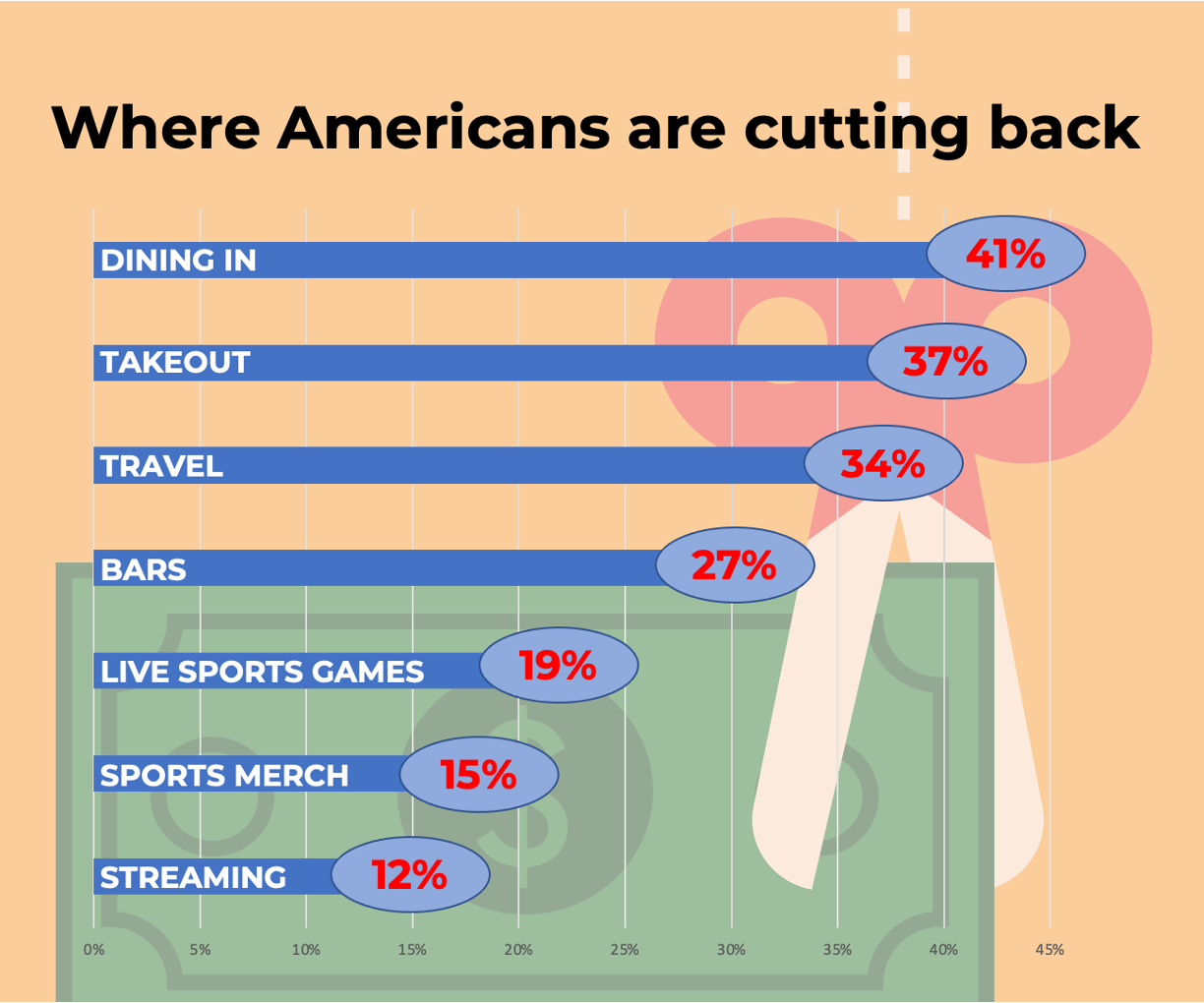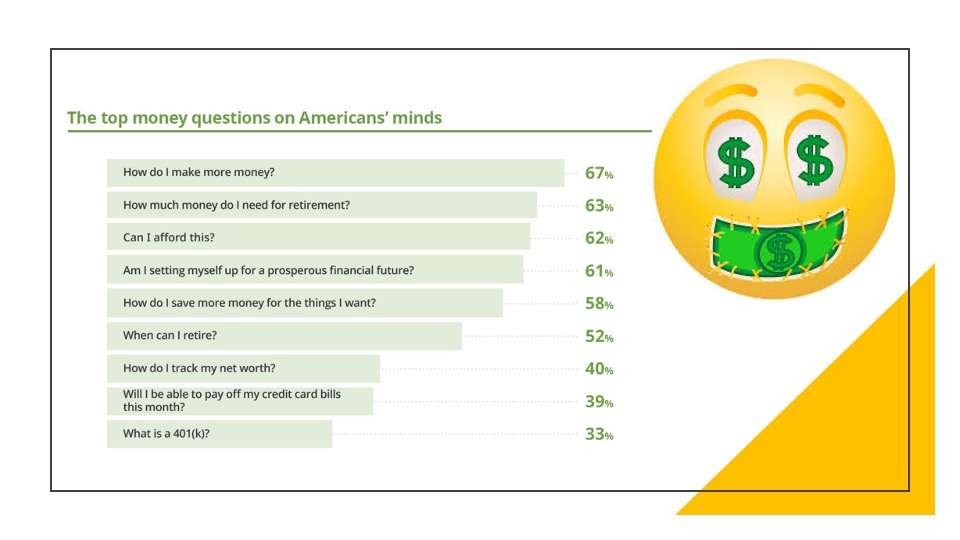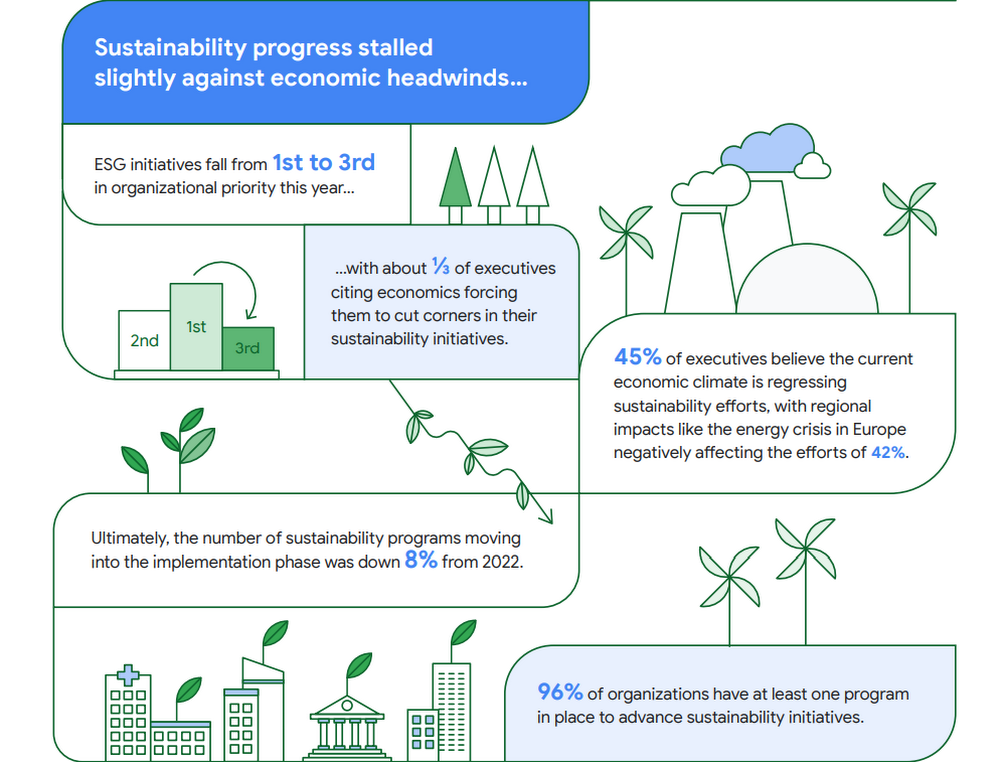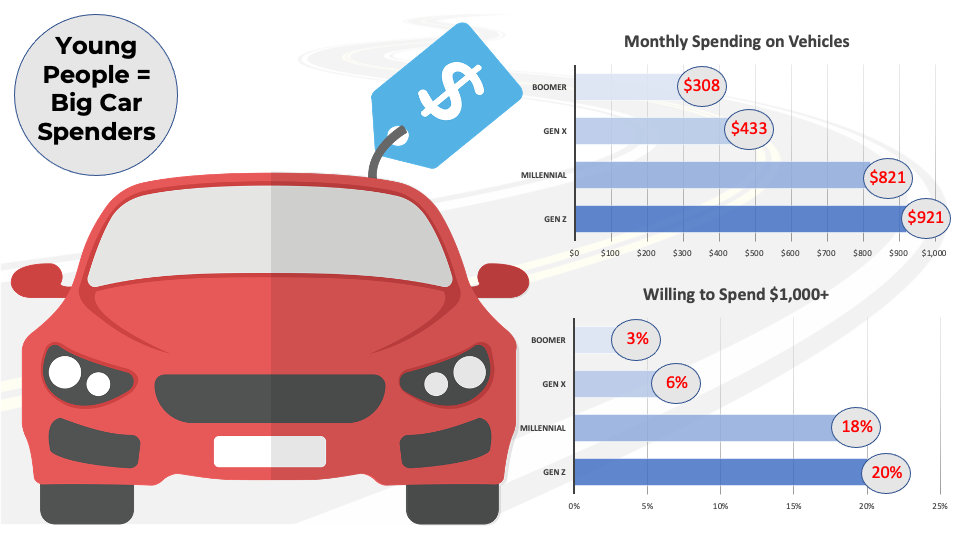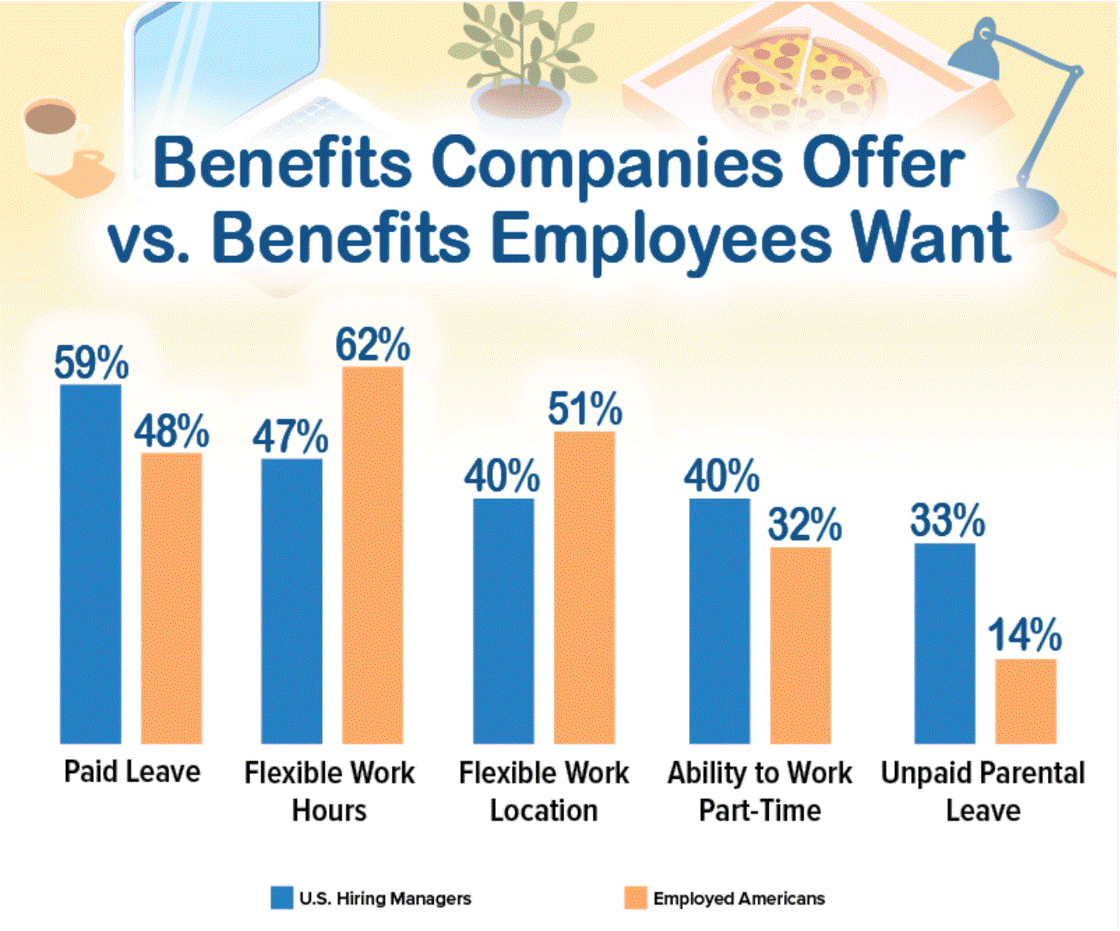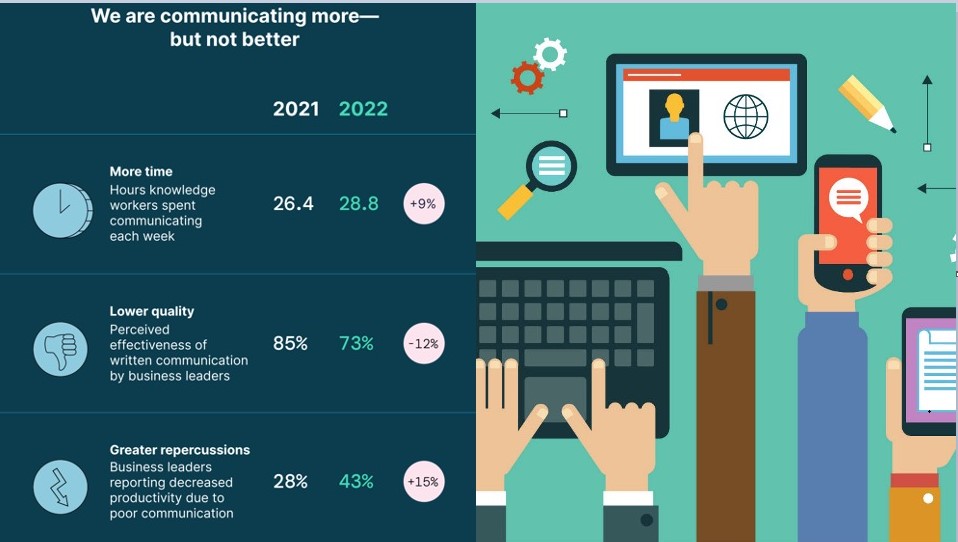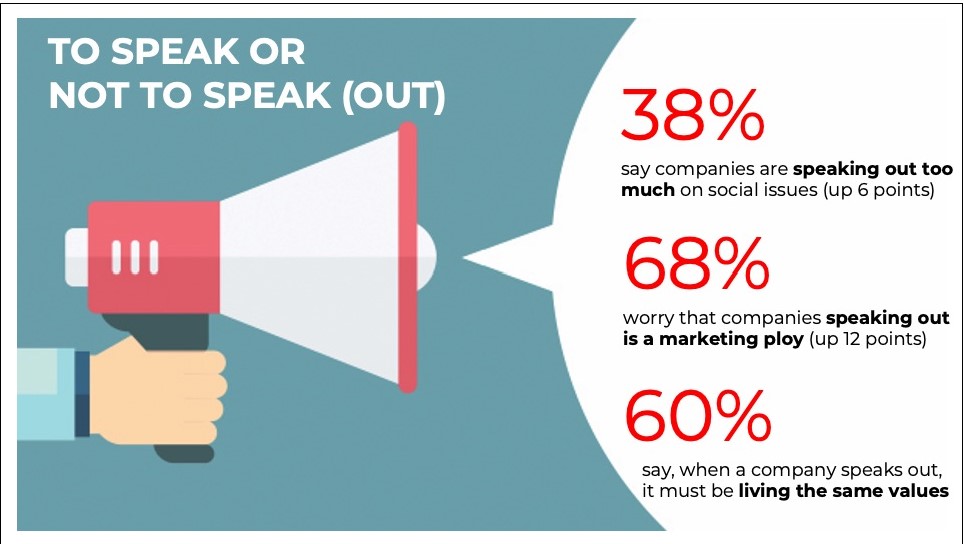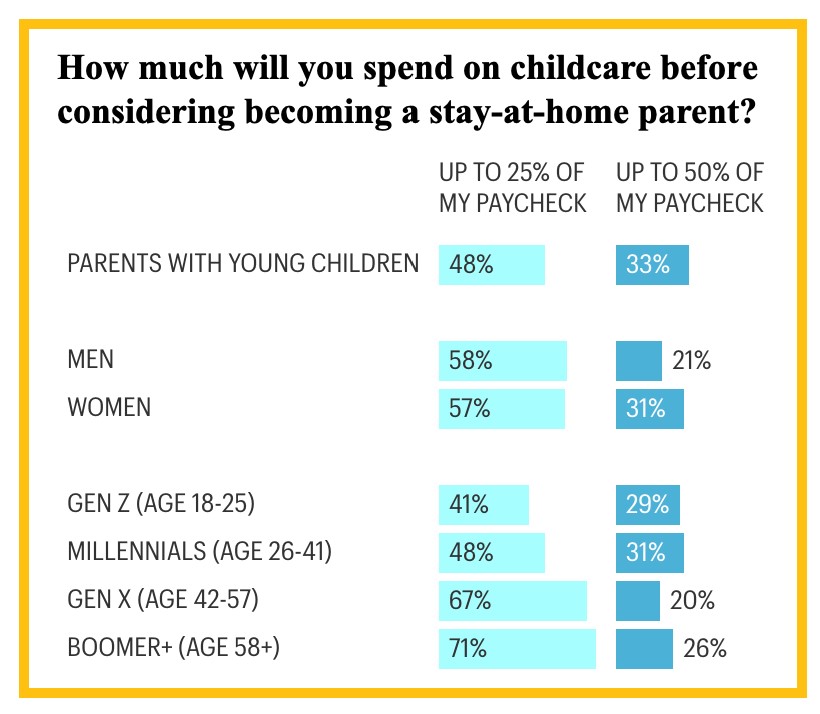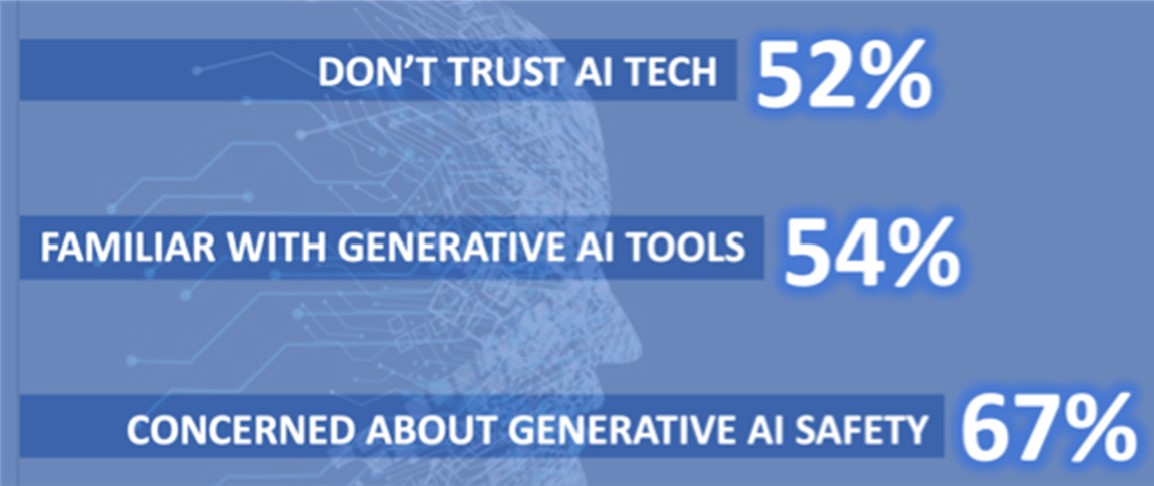By: Ray Day
CONTACT:
We wanted to share our latest consumer and business insights, based on research from Stagwell. Among the highlights of our weekly consumer sentiment tracking (fielded Apr. 21-23):
WORRIES ABOUT ECONOMY GROW AGAIN
Today, 87% of Americans are concerned about the economy and inflation – up 3 points from last week and higher than December’s 82% rate.
- 81% worry about U.S. crime rates (up 2 points from last week)
- 80% about a potential U.S. recession (up 1 point)
- 74% about political divisiveness (up 5 points)
- 70% about affording my living expenses (up 2 points)
- 71% about the War on Ukraine (up 3 points)
- 55% about a new COVID-19 variant (up 1 point)
- 45% about losing their jobs (down 3 points)
WHERE ARE AMERICANS CUTTING BACK?
Is inflation moving sports fans from the stadium to the couch? A new survey from Stagwell’s National Research Group shows that 75% of Americans say they’ve had to cut household spending during the past six months due to inflation – a quarter cutting back “significantly” – yet sports seem to be somewhat insulated.
- Those in their late 20s and early 30s, as well as those with young children at home, are among the groups most likely to have been forced to make household cutbacks.
- Where are Americans cutting back? Top spending cuts include restaurant dining (41%), takeout (37%), travel (34%) and going to bars and clubs (27%). Much lower are cutbacks on tickets to live games (19%), sports merchandise (15%) and sports packages for TV or streaming services (12%).
- That said, 26% expect to watch more sports games at home during the next 12 months, compared with 10% who plan to watch fewer.
- 31% say that they plan to travel to fewer live sports games than they have in the past, while 18% expect to go to more of them.
- A worsening economic climate is making some fans more invested in sports: 81% of sports fans agree that “sports help bring people together in times of adversity.” 71% say that “no matter what’s going on in the world, sports help me feel better.”
RELYING ON LOTTERY TICKETS MORE THAN FINANCIAL PLANNING
We seem to rely on lottery tickets more than financial planning, according to our survey with Empower.
- 71% of Americans say they have purchased a lottery ticket, and 24% say they’ve spoken to a fortune teller.
- Yet only 33% have spoken with a financial planner.
- We also know as much about celebrities’ net worth as our family’s: 58% of Americans know their net worth, 37% understand their partner’s, 28% their family’s – and 28% know Elon Musk’s net worth.
MENTAL HEALTH SYSTEM STRUGGLES WITH DEMAND
The vast majority (83%) of the nation’s behavioral health workforce believes that, without public policy changes, provider organizations won’t be able to meet the demand for mental health or substance use treatment and care in the U.S. The National Council for Wellbeing survey also warns of a potential exodus of behavioral health workers due to burnout.
- 65% report increased client caseload, and 72% reported increased client severity since the COVID-19 pandemic.
- 90% of behavioral health workers are concerned about the ability for those not currently receiving care to gain access to care.
- 87% are concerned about the ability to provide care in the event of another health crisis in the future.
- 93% said they have experienced burnout, and 62% say they are suffering from moderate or severe levels of burnout.
- 48% of behavioral health workers say the impacts of workforce shortages have caused them to consider other employment options.
- Adding to the problem: 68% of those who provide care to patients say the amount of time spent on administrative tasks takes away from directly supporting clients.
ICYMI
In case you missed it, check out some of the thought-leadership and happenings around Stagwell making news:
- What brands can learn from Gen Z’s environmental awakening
- A new survey might be the first indication that economic woes are casting clouds over the push for climate action
- Unpacking travel privilege: Why Black representation matters in travel
- A.I. might resuscitate the 50-year-old e-mail technology and make it smarter
Related
Articles
In the News, Investments & Financials, Press Releases, Talent & Awards
Jul 08, 2025
Stagwell (STGW) Advances Executive Team with Four Key Appointments

In the News, Press Releases, Thought Leadership
Jun 10, 2025
Stagwell (STGW) Chairman and CEO Mark Penn to Discuss the Irreplaceable Power of Human Creativity on the Main Stage of Cannes Lions

Events, In the News, Press Releases, Talent & Awards
Jun 05, 2025
Code and Theory Named ANA B2B Agency of the Year After Transforming the World’s Leading Brands

Newsletter
Sign Up
By: Ray Day
CONTACT:
We wanted to share our latest consumer and business insights, based on research from Stagwell. Among the highlights of our weekly consumer sentiment tracking (fielded Apr. 14-16):
WORRIES ABOUT ECONOMY MODERATE
Today, 84% of Americans are concerned about the economy and inflation – down 4 points from last week and near December’s 82% rate.
- 79% worry about U.S. crime rates (down 4 points)
- 79% about a potential U.S. recession (down 3points)
- 69% about political divisiveness (down 7points)
- 68% about affording my living expenses (down 4 points)
- 68% about the War on Ukraine (down 4 points)
- 54% about a new COVID-19 variant (down 2 points)
- 48% about losing their jobs (down 2 points)
AMERICANS SOUR ON COUNTRY’S AND PERSONAL OUTLOOK
For the first time since last year, Americans’ overall view of the economy has declined, and 52% also believe their personal finances are suffering. That’s according to our latest poll with the Center for American Political Studies at Harvard University.
- Partisanship determines Americans’ view of the economy: 30% overall say the economy on the right track, with 54% of Democrats thinking so compared with 12% of Republicans.
- 52% think their personal financial situation is getting worse.
- 66% think the U.S. government has too much debt, and 55% think the government is spending too much.
- When told the national debt is $31 trillion, 65% want Congress to raise the debt ceiling only with restraints on future spending.
- Crime is becoming a more universal concern – with 86% saying crime is a serious issue right now.
- 48% think crime and safety are getting worse in their own communities.
- Americans blame rising crime in cities on the worsening economy (23%) and prosecutors who don’t enforce the laws (22%).
ARE YOU WILLING TO POST YOUR SALARY ONLINE?
Most Americans are still hesitant to discuss money with others – except young people, according to our survey with Empower.
- 62% of Americans say they don’t talk about money, even though 66% believe more open conversations around it are key to achieving “financial freedom.”
- 34% of Americans surveyed say they’d be willing to post their salary information on LinkedIn.
- Younger professionals are even more willing to do so – with 53% of Gen Z and 58% of Millennials saying they would be okay posting how much money they make online.
- That said, 68% say they avoid uncomfortable money discussions at work.
- 56% of those surveyed say they wish discussing salaries wasn’t taboo.
- 67% of workers say they feel comfortable asking for a raise.
- 74% of men feel comfortable asking for a raise compared with 59% of women.
- 50% of men feel comfortable talking about salary with co-workers versus 36% of women.
GENERATIVE AI CHANGING THE WAY WE VIDEOGAME
Are players ready to embrace AI in gaming? Most believe generative AI is here to stay and that video games might never be the same, according to Stagwell’s National Research Group’s new report, “Pressing Play on AI: A Game-Changing Power-Up?”
- 77% of players say they’ve heard the term “generative AI.”
- 60% expect AI to have a net positive effect on the industry.
- 73% believe game developers are likely to play a major role in blazing a trail for the development of AI technology during the next five years.
- 80% say studios using AI-powered tools need to take steps to ensure that AI they use are not plagiarizing the work of artists, voice actors, writers or other creatives.
- 78% believe it’s important that the use of AI in game development doesn’t push out creativity from the process.
READY TO TRAVEL ABROAD – EXCEPT FOR HEALTH INSURANCE
Americans say they are increasingly looking to travel outside the U.S. Yet many are unprepared for a medical event during their trip, according to our survey with GeoBlue.
- 77% of travelers agree that affordable access to quality medical care abroad is just as important as booking a great place to stay or the best flights.
- 87% know a medical event is a realistic possibility, yet 52% have an “it-won’t-happen-to-me” attitude.
- 46% believe domestic health insurance would cover an international medical event.
- 76% say they likely don’t have adequate health insurance coverage for international trips.
ICYMI
In case you missed it, check out some of the thought-leadership and happenings around Stagwell making news:
Related
Articles
In the News, Investments & Financials, Press Releases, Talent & Awards
Jul 08, 2025
Stagwell (STGW) Advances Executive Team with Four Key Appointments

In the News, Press Releases, Thought Leadership
Jun 10, 2025
Stagwell (STGW) Chairman and CEO Mark Penn to Discuss the Irreplaceable Power of Human Creativity on the Main Stage of Cannes Lions

Events, In the News, Press Releases, Talent & Awards
Jun 05, 2025
Code and Theory Named ANA B2B Agency of the Year After Transforming the World’s Leading Brands

Newsletter
Sign Up
By: Ray Day
CONTACT:
We wanted to share our latest consumer and business insights, based on research from Stagwell. Among the highlights of our weekly consumer sentiment tracking (fielded Apr. 7-9):
WORRIES ABOUT ECONOMY UP AGAIN
Today, 88% of Americans are concerned about the economy and inflation – up 3 points from last week and up sharply from December’s 82% rate.
- 83% worry about U.S. crime rates (up 3 points)
- 82% about a potential U.S. recession (up 2 points)
- 76% about political divisiveness (up 2 points)
- 72% about affording my living expenses (up 2 points)
- 72% about the War on Ukraine (up 3 points)
- 56% about a new COVID-19 variant (up 1 point)
- 50% about losing their jobs (up 4 points)
ECONOMY, PUBLIC PRESSURE MAKE ESG LESS OF A PRIORITY
Environmental, social and governance (ESG) efforts have slipped on corporate priority lists due to tougher economic conditions. That’s according to our annual sustainability survey of top-level executives in 16 countries with Google Cloud.
- ESG efforts fell from the top priority last year to third this year, with many business leaders claiming they were being pressured by “external parties” to de-prioritize sustainability.
- 45% of executives believe the current economic climate is regressing sustainability efforts.
- 85% of respondents acknowledge that customers want to engage with sustainable brands.
- Yet 78% are forced to achieve sustainability-based results with reduced budgets.
- 72% claim they wanted to advance sustainability initiatives but do not know how to do so – up from 65% in 2022.
- Corporate greenwashing is listed as a major concern, with 59% admitting to overstating – or inaccurately representing – their company’s sustainability activities.
- 9 in 10 organizations are talking publicly about sustainability commitments, but only 58% are moving programs into the implementation phase and even fewer (22%) are measuring against targets.
- 72% of respondents attend at least four sustainability-related meetings every quarter.
- 63% are willing to risk lower revenue in the short term to ensure sustainable development in the long term.
MILLENNIALS FINALLY ARE HOMEOWNERS, BUT IT’S A STRUGGLE
More Millennials finally own their homes than rent, a milestone that’s taken longer than previous generations. However, homeownership still feels out of reach for many, according to our survey with Fortune.
- 52% of Millennials owned a home by the end of 2022.
- Millennial renters have an appetite for homeownership, as 88% would like to own a home someday (versus 76% for all renters).
- 69% of Millennials feel priced out of the current real estate market.
- 56% of Millennial renters believe the dream of owning a home is dead.
- 78% are worried about affording their living expenses (versus 63% for Boomers).
- 60% are worried about losing their job.
PETS OVER PARTNERS
Whose happiness is more important: your pet’s or your partner’s? If you’re a member of Gen Z, you’re more likely to say your pet’s happiness is paramount, according to our survey with Zillow.
- 60% of Gen Z think pet-friendly features are essential for the home they buy.
- A majority of Gen Z pet owners say it’s more important to have a pet-friendly home (55%) than a kid-friendly home (45%).
- 48% think a fenced backyard is a must-have, but they aren’t so concerned about having a double sink in the bathroom (28%), a home office for their partner (35%), a playroom for kids (24%) or an outdoor play set (11%).
- 73% of home buyers have at least one pet at home.
- 22% of Gen Z pet owners would want to move out of their current home if it was no longer working for their pet. That compares to only 12% who would want to move if their home was no longer working for their partner.
- In fact, 13% of pet owners who live with a significant other would rather share their primary bedroom with their pet than with their partner.
ICYMI
In case you missed it, check out some of the thought-leadership and happenings around Stagwell making news:
Related
Articles
In the News, Investments & Financials, Press Releases, Talent & Awards
Jul 08, 2025
Stagwell (STGW) Advances Executive Team with Four Key Appointments

In the News, Press Releases, Thought Leadership
Jun 10, 2025
Stagwell (STGW) Chairman and CEO Mark Penn to Discuss the Irreplaceable Power of Human Creativity on the Main Stage of Cannes Lions

Events, In the News, Press Releases, Talent & Awards
Jun 05, 2025
Code and Theory Named ANA B2B Agency of the Year After Transforming the World’s Leading Brands

Newsletter
Sign Up
By: Ray Day
CONTACT:
We wanted to share our latest consumer and business insights, based on research from Stagwell. Among the highlights of our weekly consumer sentiment tracking (fielded Mar. 31 – Apr. 2):
WORRIES ABOUT ECONOMY UP AGAIN
Today, 85% of Americans are concerned about the economy and inflation – up 2 points from last week and up from December’s 82% rate.
- 82% worry about U.S. crime rates (up 2 points)
- 81% about a potential U.S. recession (no change)
- 77% about political divisiveness (up 4 points)
- 72% about the War on Ukraine (down 2 points)
- 71% about affording my living expenses (up 3 points)
- 58% about a new COVID-19 variant (no change)
- 52% about losing their jobs (down 2 points)
YOUNG PEOPLE SPEND BIG ON CARS
Young people are spending as much as 20% of their budget on car expenses, and 25% of Americans who own a vehicle today worry that the price of fueling or charging will affect their ability to pay for other necessary goods or services. That’s according to our survey with NerdWallet.
- The average cost of car ownership in the U.S. rose 16% from 2019 to 2022, according to the U.S. Bureau of Transportation Statistics.
- Half of Americans (53%) say they plan to buy or lease a personal vehicle in the next 12 months. Of those potential buyers/leasers, 48% plan to buy/lease a used car, and 68% say they will buy/lease a new car – with some planning to buy/lease more than one vehicle.
- Overall, 43% of vehicle owners say $1,000 in monthly vehicle costs is too high.
- Yet 20% of Gen Z and 18% of Millennials are willing to spend more than $1,000 on a vehicle (compared with 6% for Gen X and 3% for Boomers).
- In actual spending, Gen Z and Millennial vehicle owners spend an average of $921 and $821 per month on their vehicles. Gen Xers spend $433 monthly, and Boomers spend $308.
- 35% of Gen Z vehicle owners say their vehicle expenses make up a significant portion of their monthly budgets.
- Parents also pay more for vehicles: Vehicle owners with children in their households spend an average of $792 per month, while those without kids spend an average of $430.
WOULD YOU BUY FROM THAT CHATBOT?
Five years ago, “conversational commerce” was the rage for online retail – with promises of widespread adoption of chatbots to place orders, resolve customer service issues and receive personalized product recommendations. Yet U.S. consumers resisted the idea, while at the same time wildly embracing generative AI. What does this mean for business? Stagwell’s National Research Group’s study on “Generative AI: A Lifeline for Conversational Commerce” takes a look at the future of digital shopping and key lessons for retailers.
- Fewer than half of Americans (47%) say they are willing to use conversational commerce to buy goods or services on social media platforms.
- Americans are most willing to buy products using conversational commerce on a social media platform from large retailers (50%), small retailers (43%) and sports brands (30%).
- The refusal of Americans to embrace conversational commerce is particularly stark when compared to the attitudes of Chinese shoppers. In China, more than 8 in 10 consumers are comfortable with the idea of buying from chatbots.
- At the same time, Americans are expressing a newfound openness to the idea of using AI-powered chat services. Among those who have heard of the concept of AI-powered search, for example, 71% say they’re excited to start using it.
ICYMI
In case you missed it, check out some of the thought-leadership and happenings around Stagwell making news:
Related
Articles
In the News, Investments & Financials, Press Releases, Talent & Awards
Jul 08, 2025
Stagwell (STGW) Advances Executive Team with Four Key Appointments

In the News, Press Releases, Thought Leadership
Jun 10, 2025
Stagwell (STGW) Chairman and CEO Mark Penn to Discuss the Irreplaceable Power of Human Creativity on the Main Stage of Cannes Lions

Events, In the News, Press Releases, Talent & Awards
Jun 05, 2025
Code and Theory Named ANA B2B Agency of the Year After Transforming the World’s Leading Brands

Newsletter
Sign Up
By: Ray Day
CONTACT:
We wanted to share our latest consumer and business insights, based on research from Stagwell. Among the highlights of our weekly consumer sentiment tracking (fielded Mar. 24-26):
WORRIES ABOUT ECONOMY DECLINE
Today, 83% of Americans are concerned about the economy and inflation – down 2 points from last week and back near December’s 82% rate.
- 79% worry about a potential U.S. recession (no change)
- 78% about U.S. crime rates (down 3 points)
- 73% about political divisiveness (up 1 point)
- 71% about the War on Ukraine (down 1 point)
- 68% about affording their living expenses (down 2 points)
- 67% about a banking crisis (new)
- 66% about the solvency of U.S. banks (new)
- 59% about the security of deposits in banks (new)
- 55% about a new COVID-19 variant (down 3 points)
- 46% about losing their jobs (down 7 points)
INFLATION STILL TOP CONCERN; BANKING CRISIS IS NOT
While Americans remain concerned about inflation, they’re not worried about the recent banking crisis and are divided on the TikTok debate. That’s according to our latest poll with the Center for American Political Studies at Harvard University.
- 67% agree with the Biden administration’s decision to step in and guarantee all customer deposits from Silicon Valley Bank and other failed banks.
- 77% of voters think the government should fully insure deposits at all U.S. banks, not just systematically important firms.
- 71% think the bank failures will affect them “not at all” or “only a little bit.”
- 67% think the deposits in their own banks are safe.
- Americans care more about inflation than the banking crisis: 54% believe the Federal Reserve should prioritize fighting inflation even if it means allowing banks to fail and could lead to a financial crisis in the short term.
- 75% see China as an enemy of the U.S., and 80% think China seeks to replace the U.S. as the key player in global affairs.
- 55% of voters think Biden’s foreign policy is too weak on China.
- At the same time, 75% are split on how to handle TikTok: 45% support a ban in the U.S., while 46% support allowing the app with conditions, such as forcing it to undergo regular security reviews or forcing its Chinese owners to sell their stakes.
MANY AMERICANS STILL FEEL ‘WEALTHY’
Even as the average American household has seen purchasing power and wealth erode, many are still feeling at least somewhat “wealthy,” according to our poll with Fast Company.
- 68% of Americans define wealth as comfort and necessities, as opposed to extravagance and excess.
- 48% say wealth is the ability to comfortably afford necessities like food and shelter with some money left over.
- 20% indicate that being able to afford necessities alone defines wealth.
- 11% define wealth as being able to afford “extravagant purchases.”
40% WORRY AI WILL TAKE THEIR JOB
Generative AI continues to be the headline of 2023 – including in the work place – with 74% of Americans having used the technology for work-related tasks yet 40% worried that the technology is going to replace them.
- The C-suite debate about ChatGPT is intense, with 56% of workers reporting their companies already have implemented discussions or restrictions about using ChatGPT.
- 38% say that the technology will make them more useful in the workplace.
- 42%, however, believe the new tool will make it harder for them to find a new job – with more than 7 in 10 believing AI will replace roles with a heavy focus on data entry and processing, media and communications, coding and even hiring. Roles expected to be replaced the most: data analysis (77%), data entry and processing (75%), media and communication (74%), content creation (73%), PR (72%), coding (71%), customer service (71%), administrative roles (71%) and hiring (71%).
1 IN 2 CAREGIVERS SUFFERING MENTALLY, FINANCIALLY
Caregivers today need support just as much as those they care for, according to our survey with CVS Health.
- 28% of Americans consider themselves to be caregivers – yet 41% say they never wanted to be a caregiver.
- 22% are not compensated for their time, with most taking care of children under the age of 18 (40%), aging parents (35%) or caring for a partner or spouse (21%).
- 47% said that being a caregiver is a financial burden, and 49% report their mental health suffers.
- 37% said they’ve had to quit their job or cut back on work hours due to caregiving responsibilities – especially younger caregivers (57% for Gen Z and young Millennials).
- Caregivers also are making sacrifices in their personal lives: 45% have spent less time participating in their hobbies, have seen their friends less (39%), are falling behind on managing their health (34%), rearranged their home to accommodate people they care for (29%) and have formed unhealthy lifestyle habits (28%).
ICYMI
In case you missed it, check out some of the thought-leadership and happenings around Stagwell making news:
- Physical and mental health, DEI and workplace flexibility revealed as top employee priorities
- Americans don’t assume moms will stay home with their kids, but the gender pay gap, motherhood penalty, and childcare crisis makes it hard for them to keep working
- 27% of Americans think texting while driving is socially acceptable
- Athletes Maria Sharapova, Allyson Felix and Spencer Dinwiddie Join Stagwell, United Airlines, Diageo, Penske Media Corporation and Axios at Cannes Lions 2023
Related
Articles
In the News, Investments & Financials, Press Releases, Talent & Awards
Jul 08, 2025
Stagwell (STGW) Advances Executive Team with Four Key Appointments

In the News, Press Releases, Thought Leadership
Jun 10, 2025
Stagwell (STGW) Chairman and CEO Mark Penn to Discuss the Irreplaceable Power of Human Creativity on the Main Stage of Cannes Lions

Events, In the News, Press Releases, Talent & Awards
Jun 05, 2025
Code and Theory Named ANA B2B Agency of the Year After Transforming the World’s Leading Brands

Newsletter
Sign Up
By: Ray Day
CONTACT:
We wanted to share our latest consumer and business insights, based on research from Stagwell. Among the highlights of our weekly consumer sentiment tracking (fielded Mar. 17-19):
WORRIES ABOUT ECONOMY STEADY
Today, 85% of Americans are concerned about the economy and inflation – steady with last week and up from 82% rate in December.
- 81% worry about U.S. crime rates (up 1 point)
- 79% about a potential U.S. recession (down 1 point)
- 72% about the War on Ukraine (up 3 points)
- 72% about political divisiveness (down 2 points)
- 70% about affording their living expenses (no change)
- 58% about a new COVID-19 variant (up 3 points)
- 53% about losing their jobs (up 7 points)
62% OF EMPLOYEES WANT FLEXIBLE WORK HOURS; 47% OF COMPANIES OFFER THEM
Flexibility remains king for non-traditional benefits workers feel companies should offer, yet less than half of businesses do so. This is according to our survey with Express Employment Professionals.
- From an employee perspective, it is important that a company offers flexible work hours (62%), flexible work locations (51%), paid leave (48%) and shortened work weeks (36%).
- Yet less than half of hiring decision-makers report their companies do so: 47% say they offer flexible work hours, 40% flexible work locations, 48% paid leave and 23% shortened work weeks.
- Regarding traditional benefits, 54% of U.S. hiring managers say offerings will remain the same as they were in 2022, and 37% expect traditional benefits will increase this year – a significant drop since the first half of 2022, when 50% were talking about traditional benefit increases.
WOMEN KEEP CANNABIS USE QUIET
Many American women are using cannabis but are keeping it quiet, according to our survey with MedMen.
- 37% of American women 21+ use cannabis regularly, with 28% using it at least once a month.
- Younger women are more than twice as likely to use cannabis (ages 21-44: 57%) than older women (ages 45+: 22%).
- Women say they primarily use cannabis for therapeutic reasons, such as relieving anxiety (60%), helping to sleep (58%) and relieving pain (53%).
- Nearly two thirds of women who use cannabis (65%) say there are people in their life who still do not know, including their parents (26%), children (22%) and coworkers (21%).
WOMEN ALSO DEMAND MORE RESPECT
Women believe society expects too much from them and does not respect them enough, according to further insights from our State of Women Report 2023 with theSkimm.
- Released during Women’s History Month, the report investigates and surfaces how women see the work they do, both in their careers and in the home, and how society perceives that work.
- 74% say that “society treats women like second-class citizens” and the “deck is stacked against women.”
- 79% say “I am concerned with the social expectations around unpaid labor/mental load that women are responsible for.”
- 65% say “new legislation and policies that are being passed do not advance women’s rights.”
- 89% are planning to redesign their lives the way they want to.
- 87% have or want to create more sources of financial stability, with 60% adding a side hustle, shifting to a higher-earning career or advocating for a promotion.
- 65% (74% among Black women) have become involved, or plan to, in national politics.
ICYMI
In case you missed it, check out some of the thought-leadership and happenings around Stagwell making news:
- Americans want weight loss drugs like Ozempic to be covered by insurance. Most of the time, they aren’t.
- More Than 1 in 5 U.S. Adults Have Considered Leaving Their Job In the Last Year to be Self-Employed
- More American women are single than ever before—and it’s costing them big money
- What’s on the Easter table and in the basket? Instacart reveals the most popular ‘eats and treats’
Related
Articles
In the News, Investments & Financials, Press Releases, Talent & Awards
Jul 08, 2025
Stagwell (STGW) Advances Executive Team with Four Key Appointments

In the News, Press Releases, Thought Leadership
Jun 10, 2025
Stagwell (STGW) Chairman and CEO Mark Penn to Discuss the Irreplaceable Power of Human Creativity on the Main Stage of Cannes Lions

Events, In the News, Press Releases, Talent & Awards
Jun 05, 2025
Code and Theory Named ANA B2B Agency of the Year After Transforming the World’s Leading Brands

Newsletter
Sign Up
By: Ray Day
CONTACT:
We wanted to share our latest consumer and business insights, based on research from Stagwell. Among the highlights of our weekly consumer sentiment tracking (fielded Feb. 17-19):
WORRIES ABOUT ECONOMY MODERATE:
Today, 87% of Americans are concerned about the economy and inflation – down 3 points from last week and up from 82% in December.
- 80% worry about U.S. crime rates (down 4 points)
- 80% about a potential U.S. recession (down 2 points)
- 73% about political divisiveness (down 2 points)
- 72% about the War on Ukraine (no change)
- 68% about affording their living expenses (down 7 points)
- 55% about a new COVID-19 variant (no change)
- 46% about losing their jobs (down 1 point)
WORK FROM HOME BUT INTERVIEW IRL
A recent Harris Poll found that 41% of Americans are likely to consider pursuing a new job within the next six months. In our latest survey with American Staffing Association, remote employees like working from home, yet they want to meet their new boss face-to-face first.
- 70% of job seekers say they want to interview in person for a new job rather than a video (17%) or phone call (9%).
- 67% say they feel the need to modify their usual appearances in some way before a job interview.
- Before an interview, more Black Americans feel the need to shave their facial hair (33% versus 22% for White Americans), while both Hispanic (19%) and Black Americans (17%) also feel the need to cover tattoos (White 10%) and remove facial piercings (18% for Hispanic, 14% for Black and 9% for White).
COMMUNICATING MORE BUT NOT BETTER:
Today’s hybrid workplace is a whirlwind of communication – with employees spending more than 70% of their work week communicating on various channels. That’s up from last year – yet poor communications also is causing a steep decline in productivity and effectiveness, according to our “State of Business Communication: The Path to Productivity, Performance, and Profit” report with Grammarly.
- Employees are spending 9% more time communicating – 28.8 hours a week – compared with last year.
- Leaders report a 12% drop in the effectiveness of written communication over the same period and a 15% decline in productivity.
- This is causing employee stress – with workers reporting a 7% increase in stress due to poor communications compared with a year ago.
- 84% of business leaders are feeling the downsides of poor communication, with lower productivity, missed deadlines and increased costs ranking as the top three.
- Most leaders (60%) and nearly half (45%) of workers say personal connections have suffered in the hybrid workplace.
- 68% of leaders say they lost at least $10,000 or more in business in the past year due to poor communications. One in five also say poor communications eroded their brand credibility or reputation.
DOCTORS DON’T HAVE TIME FOR YOUR DATA
As patient portals become more common and telehealth data pours in from apps and wearables, doctors have more data than time, according to our survey with ZS.
- 71% of primary care physicians say they have more data than they can handle.
- The patient data problem is compounded by the fact that 57% of doctors report that technology flaws are a barrier to having better-connected health care.
- 86% of primary care physicians say that a lack of reimbursement for connecting health care is a hurdle.
ICYMI:
In case you missed it, check out some of the thought-leadership and happenings around Stagwell making news:
- February Harvard CAPS-Harris Poll: Perception of economy is improving but only a third believe it is on the right track
- All Generations Find Telehealth Beneficial, New CVS Health Data Shows
- Almost Two-Thirds of U.S. Doctors, Nurses Feel Burnt Out at Work
- Streamer ads performed well during the Super Bowl
As always, if helpful, we would be happy to provide more info on any of these data or insights. Please do not hesitate to reach out.
Thank you.
Related
Articles
In the News, Investments & Financials, Press Releases, Talent & Awards
Jul 08, 2025
Stagwell (STGW) Advances Executive Team with Four Key Appointments

In the News, Press Releases, Thought Leadership
Jun 10, 2025
Stagwell (STGW) Chairman and CEO Mark Penn to Discuss the Irreplaceable Power of Human Creativity on the Main Stage of Cannes Lions

Events, In the News, Press Releases, Talent & Awards
Jun 05, 2025
Code and Theory Named ANA B2B Agency of the Year After Transforming the World’s Leading Brands

Newsletter
Sign Up
By: Ray Day
CONTACT:
We wanted to share our latest consumer and business insights, based on research from Stagwell. Among the highlights of our weekly consumer sentiment tracking (fielded Feb. 10-12):
WORRIES ABOUT ECONOMY JUMP:
Today, 90% of Americans are concerned about the economy and inflation – up 5 points from last week and up sharply from 82% in December.
- 84% worry about U.S. crime rates (up 6 points)
- 82% about a potential U.S. recession (up 2 points)
- 75% about affording their living expenses (up 5 points)
- 75% about political divisiveness (up 3 points)
- 72% about the War on Ukraine (up 2 points)
- 55% about a new COVID-19 variant (down 2 points)
- 47% about losing their jobs (up 2 points)
WHEN SHOULD COMPANIES SPEAK OUT?:
Following the State of the Union (SOTU) address, we surveyed Americans to pinpoint their views on the buy-American theme as well as to update our past research on companies “speaking out” on social issues. We found strong views on both.
“Made in America”
- Nearly three-quarters (73%) of Americans say they often seek American-made products and brands when shopping (up 1 point from July 2022), especially true among those who watched some or all of the SOTU.
- Regarding intentionally purchasing American-made products and brands, 71% report doing so a little bit or a lot.
- 53% have shopped for an American-made product in the last month.
- 76% of Americans agree that there should be more American-made products and brands available in the U.S.
- 76% agree that brands need to make more products in the U.S. (up 1 point from July 2022).
- 56% would be willing to pay more for a product if they knew it was American made.
- However, 45% believe that American-made products already are too expensive.
“Speaking Out in America”
- A third of Americans (38%) think that American companies are speaking out too much on social issues (up 6 points from July 2022).
- 37% believe companies are speaking out the right amount (down 3 points from July 2022), while 25% believe they aren’t speaking out enough (down 3 points).
- 68% of Americans think that, when companies voice their opinion on a social issue, it’s a marketing ploy (up 12 points from July 2022).
- When companies are speaking out on social issues, 71% of Americans agree that a company’s history on social issues is important.
- 60% agree that when a company speaks out on social issues, it must be supported by living their internal company values.
- More Americans believe that there is generally more risk (59%) to a CEO speaking out on social issues (up 5 points from April 2022) than reward (41%).
- Democrats (55%) are more likely to believe there is more reward in a CEO speaking out than Republicans (33%).
- Americans also believe that CEOs expressing their own political views is bad for the company (47%, up 5 points from April 2022), more so than good.
TRAVEL TRENDS FOR THE NEXT DECADE:
During the next three years, nearly 2 billion people will travel at least once a year – making the travel and hospitality industry continually attractive. Yet what does the future hold? Stagwell’s Northstar partnered with travel technology company Amadeus on new research defining four new types of travelers – in a report titled Traveler Tribes 2033 – who will emerge in the next decade along with suggestions on what brands need to do to create relevant travel experiences for them.
- Excited Experientialists:
- 44% are without children and have a mid- to high-income job with flexible working options, which enables them to readily explore the world. They are more likely than other travelers to act on instinct, making them “anti-planners” and favoring less predictable and more exciting accommodation experiences. They also are open to technology like the use of artificial intelligence in the airport environment.
- Memory Makers:
- 44% are ages 42 and older and are habitual in their travel behaviors. They put people first and place less value on technology and sustainability, reassured by existing methods. Despite their skepticism about technology, they are excited about virtual reality and augmented reality preview tours before purchasing a trip.
- Travel Tech-fluencers:
- 48% of the group are under the age of 32, and their perspective is symbolized by how much technology they own. While many want to travel sustainably, they are more conscious about sustainability options around their method of travel, rather than where they’ll be staying.
- Pioneering Pathfinders:
- 82% are between the ages of 23 and 41. They like to plan but are not afraid of risk and are open to new experiences. This group is more willing than others to let sustainability influence their decisions. They will be very comfortable using all forms of alternative payment methods – whether cryptocurrency or within a virtual reality environment.
EMPLOYEES AND HR DISAGREE ON RACIAL EQUITY PROGRESS:
Our new State of Inequity report with Hue illuminates wide disparities along racial lines in workplace opportunity, compensation and experience in a post-pandemic labor market.
- More than 200,000 Black and Latina women have disappeared from the workforce since the pandemic’s beginning. Many have stopped looking for new jobs, making them invisible to unemployment statistics and ineligible for federal benefits.
- Most BIPOC employees report their employer has not instituted racial awareness training (82%) nor have they increased recruiting efforts toward racially diverse hiring (81%).
- A gap exists between HR and employees: 84% of BIPOC employees report their company has not addressed the mental/emotional impact of discrimination on its employees of color since June 2020. At the same time, 91% of HR professionals surveyed say the various diversity-related initiatives their companies have implemented are effective.
- One in four BIPOC women report not being paid fairly and in a comparable way to other colleagues at their level across their company.
- BIPOC women are twice as likely not to be paid fairly and in a comparable way to other colleagues across their company compared to white men.
- Two in Five BIPOC women reported feeling exhausted or burned out last year because of their workplace.
- BIPOC women are twice more likely to report they have felt fatigued related to racial tension or issues at work in the last six months compared to white men.
- More BIPOC women are not comfortable being fully themselves at work, twice as likely compared to white men.
- Even in the face of workplace hardships, BIPOC women are investing in themselves. Nearly twice as many BIPOC women (45%) report gaining new skills or education to become a more competitive job candidate compared to white Americans (27%).
ICYMI:
In case you missed it, check out some of the thought-leadership and happenings around Stagwell making news:
- Vast Majority of Americans Prefer In-Person Job Interviews vs. Virtual
- Exploring the future of money
- The high price of being single: ‘It’s all on one person’
- Americans With Trouble Sleeping Report Their Sleep Affects Their Relationships
As always, if helpful, we would be happy to provide more info on any of these data or insights. Please do not hesitate to reach out.
Thank you.
Related
Articles
In the News, Investments & Financials, Press Releases, Talent & Awards
Jul 08, 2025
Stagwell (STGW) Advances Executive Team with Four Key Appointments

In the News, Press Releases, Thought Leadership
Jun 10, 2025
Stagwell (STGW) Chairman and CEO Mark Penn to Discuss the Irreplaceable Power of Human Creativity on the Main Stage of Cannes Lions

Events, In the News, Press Releases, Talent & Awards
Jun 05, 2025
Code and Theory Named ANA B2B Agency of the Year After Transforming the World’s Leading Brands

Newsletter
Sign Up
By: Ray Day
CONTACT:
We wanted to share our latest consumer and business insights, based on research from Stagwell. Among the highlights of our weekly consumer sentiment tracking (fielded Feb. 3-5):
WORRIES ABOUT JOB LOSSES JUMP:
Today, 85% of Americans are concerned about the economy and inflation – down 2 points from last week and up from 82% in December. Concerns about job losses, however, are on the rise.
- 80% worry about a potential U.S. recession (down 2 points)
- 78% about U.S. crime rates (down 3 points)
- 72% about political divisiveness (down 3 points)
- 70% about affording their living expenses (up 4 points)
- 70% about the War on Ukraine (up 1 point)
- 57% about a new COVID-19 variant (down 1 point)
- 45% about losing their jobs (up 3 points)
18% OF GEN Z WOULD BE HAPPY TO BE LAID OFF:
“Laid off and loving it” is the mood of a small but vocal group of employees caught in the job cuts roiling firms from Wall Street to Silicon Valley, according to our survey with Bloomberg.
- 18% of Gen Z and 15% of Millennial employees say they would be happy being laid off, more so than their older colleagues (Gen X: 8%, Boomers: 6%).
- Overall, one in 10 employees say they would feel thankful (9%), relieved (10%) and happy if laid off today (12%).
- Of those who experienced a layoff in the last year, 42% spent more time with friends and family, on their hobbies (28%) and their physical (26%) and mental health (29%).
- Most employed Americans (43%) say that, if they were laid off today, they would find another job within three months. Yet that changes across generations, with Boomers (28%) less likely to think so than Gen Z (43%), Millennials (48%) or Gen X (47%).
CHILDCARE SPENDING HAS ITS LIMITS:
How much are you willing to spend on childcare before it no longer makes sense to work? Most Americans say an average of $617 a month is fair. Yet, if childcare costs eat away a quarter of their paycheck or more, nearly half of parents with young children under the age of 5 would consider being a stay-at-home parent, according to our survey with Fortune.
- On average, U.S. families spend an average of 17.8% of their income on childcare.
- Younger workers are more willing than older Americans to pay more for childcare. And fathers are willing to spend about $100 more per month than mothers ($668 versus $568).
- More than a third of stay-at-home parents say they left their jobs to care for their children because of financial difficulties in affording childcare (19%) or limited childcare availability (17%).
- Among former and current stay-at-home parents, 36% say they felt forced into leaving the workforce to care for their children.
- 87% of Americans say they would continue working if childcare was more accessible – with high agreement across all age groups.
- 52% of stay-at-home parents with children under the age of 5 believe their careers have been negatively affected by that choice.
- 68% of both men and women believe mothers are penalized more in the workforce after staying home to care for children.
MORE TRUST CONCERNS ABOUT AI:
Americans rely on artificial intelligence to inform everyday consumer choices like movie recommendations and customer service inquiries, yet they draw the line when it comes to trusting AI for high-value applications, such as autonomous vehicles, accessing government benefits and healthcare. Our survey with MITRE also found:
- 48% of Americans believe AI is safe and secure.
- 78% are very or somewhat concerned that AI can be used for malicious intent.
- 82% of Americans and 91% of tech experts support government regulation.
- 70% of Americans and 92% of tech experts agree that there is a need for industry to invest more in AI assurance measures to protect the public.
- Three-quarters of Americans are concerned about deepfakes and other AI-generated content.
- Only 49% would be comfortable having an AI-based online chat for routine medical questions.
- Similarly, only 49% would be comfortable with the federal government using AI to assist benefits processing.
ESG INVESTOR INTEREST GROWS
Most investors are interested in ESG and want their advisors to show them the path forward, based on our survey with Nuveen.
- 75% of investors older than 21 with at least $100,000 in investable assets see their company ownership as a way to get businesses to address ESG-related risks and opportunities.
- 57% would be interested in shifting their portfolios to invest only in companies with net-zero emissions.
- 80% said that companies should be more transparent about ESG issues.
- 73% said they would be more likely to invest in businesses that are open about their plans for addressing those factors.
- Last year’s findings from the 2022 Milken Institute Harris Poll Listening Project found that 68% of executives said their company has as much as a quarter of their portfolio dedicated to ESG investments. Yet 32% said their companies lack ESG investments entirely.
ICYMI:
In case you missed it, check out some of the thought-leadership and happenings around Stagwell making news:
- ‘Funny,’ ‘light-hearted’ and ‘unique’ are top qualities the public wants in Super Bowl ads
- Building brand fandom at the Super Bowl
- Pandemic Pushes Planned Retirement Age by 3 Years
- Gen Z and Millennials Accept Online Creeping and Stalking as Part of Dating Culture
- Stagwell’s Instrument opens applications for 2023 pro bono program supporting black and systemically excluded communities
As always, if helpful, we would be happy to provide more info on any of these data or insights. Please do not hesitate to reach out.
Thank you.
Related
Articles
In the News, Investments & Financials, Press Releases, Talent & Awards
Jul 08, 2025
Stagwell (STGW) Advances Executive Team with Four Key Appointments

In the News, Press Releases, Thought Leadership
Jun 10, 2025
Stagwell (STGW) Chairman and CEO Mark Penn to Discuss the Irreplaceable Power of Human Creativity on the Main Stage of Cannes Lions

Events, In the News, Press Releases, Talent & Awards
Jun 05, 2025
Code and Theory Named ANA B2B Agency of the Year After Transforming the World’s Leading Brands

Newsletter
Sign Up
By: Ray Day
CONTACT:
We wanted to share our latest consumer and business insights, based on research from Stagwell. Among the highlights of our weekly consumer sentiment tracking (fielded Jan. 27-29):
ECONOMIC WORRIES MIXED:
Today, 87% of Americans are concerned about the economy and inflation – up 1 point from last week and up from 82% in December.
- 82% worry about a potential U.S. recession (down 1 point)
- 81% about U.S. crime rates (up 1 point)
- 75% about political divisiveness (up 4 points)
- 69% about the War on Ukraine (up 1 point)
- 66% about affording their living expenses (down 5 points)
- 58% about a new COVID-19 variant (down 2 points)
- 42% about losing their jobs (down 7 points)
PARENTS WANT CHILDCARE SUPPORT AT WORK:
Parents increasingly feel unsupported in the workplace and expect more childcare support from employers and the government, based on our new Parent Confidence Report with KinderCare.
- 61% of working parents say there is a disconnect between the level of support they need and the benefits their employer provides.
- Childcare benefits are the second most important reason for parents staying at their current job – with 18% ranking them as the most crucial benefit – behind health insurance.
- More than half of working parents would stay at their current job if their employer provided childcare benefits, such as pre-tax benefits, emergency/backup childcare and on-site childcare.
- 70% of parents say childcare is at a crisis point in terms of accessibility and affordability.
- 66% believe the government should offer universal childcare to all children, from birth to kindergarten.
1 IN 10 LOOKING FOR NEW HOME, BUT WITH UNREALISTIC PRICE EXPECTATIONS:
For the fifth year in a row, most Americans (83%) say buying a home is a priority. Yet, in our latest survey with NerdWallet, high mortgage rates and a seller-friendly housing market prove to be obstacles – along with unrealistic home price expectations.
- 11% of Americans say they plan to buy a home in the next year.
- Prospective buyers hope to spend $269,200 on average. This is significantly lower than the typical home price of $379,100.
- 32% of Americans feel worse about their ability to purchase a home in 2023 than in 2022 (a 7-point increase from last year).
- The top reasons for the more negative outlook include a worsening economy (58%), higher mortgage rates (57%) and higher home prices (57%).
- 67% of Americans say a housing market crash is imminent in the next three years.
INVESTORS RETHINK RETIREMENT PLANS:
Turbulent market conditions and rampant inflation have forced investors to consider working after retirement, based on our survey with Nationwide.
- 69% of non-retired investors say post-retirement employment could lie ahead.
- 44% of these investors inclined to keep working say they’ll have to supplement their retirement savings or income out of necessity.
- 40% of non-retired investors plan to move to a different city or region after retiring, with the most common reasonings being lower cost of living (43%) and lower taxes (34%) – far ahead of being closer to family (22%).
- 49% of non-retired investors with a financial advisor are “very nervous” about spending down their retirement savings in today’s current market environment.
LACK OF TRUST OVERSHADOWS NEW AI TOOLS:
Businesses might need to slow their roll when it comes to adopting AI tools like ChatGPT and DALL-E2, according to our latest study with AdAge.
- 52% don’t trust AI tech.
- 54% are familiar with generative AI tools, and nearly a fifth have used one.
- 67% of Americans are concerned about the safety of generative AI technology.
- Only 29% said they have not used generative AI nor are they interested in doing so.
- Less than half (44%) say that it is easy to tell the difference between something created by AI and something created by a human.
- 58% think things created by generative AI tools are less impressive than things created by people.
ICYMI:
In case you missed it, check out some of the thought-leadership and happenings around Stagwell making news:
- Five Things to Know About ChatGPT
- Generative AI – how marketers should navigate consumer distrust
- Augmented reality. The bright future of women’s sports. What Gen Z wants from work. Stagwell’s National Research Group explores all of these topics in a new premium magazine, Boundless.
- 20 brands gaining popularity with Gen Z
- About three-quarters of people who plan to watch the Super Bowl said they’re excited for the ads
- Big Tech’s Free Ride Is Coming to an End
As always, if helpful, we would be happy to provide more info on any of these data or insights. Please do not hesitate to reach out.
Thank you.
Related
Articles
In the News, Investments & Financials, Press Releases, Talent & Awards
Jul 08, 2025
Stagwell (STGW) Advances Executive Team with Four Key Appointments

In the News, Press Releases, Thought Leadership
Jun 10, 2025
Stagwell (STGW) Chairman and CEO Mark Penn to Discuss the Irreplaceable Power of Human Creativity on the Main Stage of Cannes Lions

Events, In the News, Press Releases, Talent & Awards
Jun 05, 2025
Code and Theory Named ANA B2B Agency of the Year After Transforming the World’s Leading Brands


